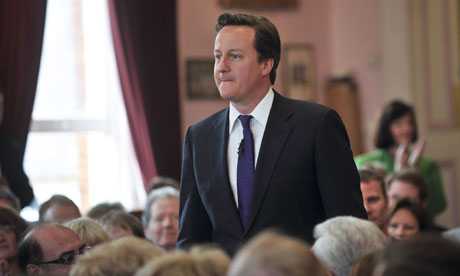The prime minister warns in a speech that an unwillingness to integrate has created a disjointed Britain

Full text of David Cameron’s speech
Comments (964)
- Nicholas Watt, chief political correspondent
- The Guardian, Thursday 14 April 2011
- Article history
In his most outspoken speech on immigration since becoming prime minister, Cameron will blame Labour for allowing immigration to become “too high” and for adopting an approach that allowed the British National party to flourish.
The prime minister will open his speech, in Hampshire, by saying that immigration is a hugely emotive subject that must be handled with sensitivity. But he will then say that Labour presided over the “largest influx” of immigration in British history, which saw 2.2 million more people settling in Britain between 1997 and 2009 than leaving to live abroad.
Cameron will say this has placed serious pressure on schools, housing and the NHS, and has also created social pressures.
“Real communities are bound by common experiences forged by friendship and conversation, knitted together by all the rituals of the neighbourhood, from the school run to the chat down the pub. And these bonds can take time,” he will say.
“So real integration takes time. That’s why, when there have been significant numbers of new people arriving in neighbourhoods, perhaps not able to speak the same language as those living there, on occasions not really wanting or even willing to integrate, that has created a kind of discomfort and disjointedness in some neighbourhoods. This has been the experience for many people in our country – and I believe it is untruthful and unfair not to speak about it and address it.”
The prime minister will stride into sensitive political territory when he accuses Labour of helping to stoke an uncertain climate over immigration. Cameron believes Labour inflamed the issue by accusing critics of racism while at the same time pandering to the hard right. He will say: “I believe the role of politicians is to cut through the extremes of this debate and approach the subject sensibly and reasonably. The last government, in contrast, actually helped to inflame the debate. On the one hand, there were Labour ministers who closed down discussion, giving the impression that concerns about immigration were somehow racist. On the other, there were ministers hell-bent on burnishing their hardline credentials by talking tough but doing nothing to bring the numbers down.
“This had damaging consequences in terms of controlling immigration and in terms of public debate. It created the space for extremist parties to flourish, as they could tell people that mainstream politicians weren’t listening to their concerns or doing anything about them.”
The speech may add to coalition tensions after the Liberal Democrats distanced themselves from the prime minister’s language. Nick Clegg saw the speech which he “noted rather than approved”.
One Lib Dem source said: “We use different language. But we all work in government to strike a balance to ensure Britain has a system people have confidence in.”
No 10 insisted that the speech does not mark a return to the era of William Hague as Tory leader when he used the issue as part of a “core votes” strategy. On the eve of the 2001 election, Hague warned that Britain was in danger of turning into a “foreign land” in remarks that technically referred to the EU. Cameron will say that Britain has benefited hugely from immigration. “Go into any hospital and you’ll find people from Uganda, India and Pakistan who are caring for our sick and vulnerable. Go into schools and universities and you’ll find teachers from all over the world, inspiring our young people.”
But the prime minister will use his speech to challenge those who say:
• Immigration cannot be controlled because Britain is a member of the EU. Cameron will say that future EU member states will be subject to tougher transitional controls and the UK can address immigration from outside the EU through the cap on non-EU immigration.
• Immigration can be controlled – but to do so would inflict serious damage on the economy. Cameron will say the government is thinking “incredibly carefully” about which workers should come.
But the prime minister will make clear that immigration cannot be controlled until Britain’s welfare system is reformed. “Put simply, we will never control immigration properly unless we tackle welfare dependency. That’s another powerful reason why this government is undertaking the biggest shake-up of the welfare system for generations making sure that work will always pay and ending the option of living a life on the dole when a life in work is possible.”
The prime minister will also condemn forced marriages and those who say they should be tolerated. “There are forced marriages taking place in our country, and overseas as a means of gaining entry to the UK. This is the practice where some young British girls are bullied and threatened into marrying someone they don’t want to.
“I’ve got no time for those who say this is a culturally relative issue – it is wrong, full stop, and we’ve got to stamp it out. Then there are just the straightforward sham marriages.”In February, the prime minister gave a speech in Munich condemning “state multiculturalism” which had “tolerated these segregated communities behaving in ways that run counter to our values”.






